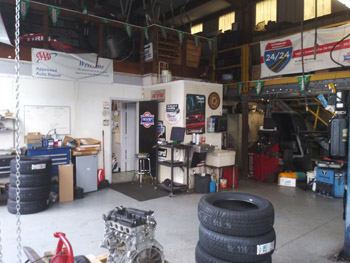All Categories
Featured

[/image]

When it comes to automobile maintenance, the brakes are perhaps the most important system for guaranteeing your security. Routine brake evaluations are important to maintaining your stopping system in leading problem.
- Why Brake Evaluations Are Crucial. Brakes are developed to put on down gradually, but without routine inspections, you may not discover when they become less effective. A malfunctioning brake system can result in severe mishaps, increased repair service prices, and even the requirement to replace various other car parts.
Brake evaluations not just aid you catch possible problems prior to they intensify, however they also permit better stopping efficiency, enhanced car life expectancy, and enhanced safety and security.
- Recognizing Caution Indications for Brake Problems. While routine assessments are crucial, you don't have to wait up until your auto's next browse through to the technician. Look for these indication that may suggest it's time for an examination:
Uncommon Noises: A shrill screech or grinding noise when using the brakes usually signifies that the brake pads are used down or harmed. Soft or Mushy Brake Pedal: If the brake pedal feels soft or squishy when pressed, there might be air or dampness in the brake lines, or the brake liquid might be low. Pulling away: If the car pulls away while stopping, it can indicate irregular brake pad wear or a hydraulic problem in the brake system. Resonance in the Wheel or Pedal: If you experience resonance or pulsation when braking, it might signify warped blades or irregular brake pad wear. Enhanced Stopping Distance: If it takes longer than normal to bring your vehicle to a quit, it might be time to inspect the brake pads, fluid levels, or blades. If you observe any one of these indicators, it's finest to have your brakes examined instantly by a specialist.
- Trick Components Checked During a Brake Evaluation. During a brake examination, a licensed technician will certainly analyze numerous vital parts of the brake system to guarantee they're working correctly. A few of the most integral parts to check include:
Brake Pads: These are the friction material that presses against the brake rotor to decrease the lorry. Gradually, the brake pads wear down and require replacing. Brake Rotors: Rotors are the metal discs that the brake pads clamp down on. They should be smooth and without deep grooves or splits. Brake Liquid: The brake liquid moves the force from the pedal to the brakes. Reduced fluid levels or old, infected liquid can bring about inadequate braking performance. Brake Lines: Brake lines lug fluid from the master cylinder to the brake components. They should be looked for leaks, cracks, or damage. Brake Calipers: These secure the brake pads onto the blades. They must be in good working order and devoid of leaks. Frequently checking these components ensures your braking system works smoothly and helps you prevent harmful driving circumstances.
- How Frequently Should You Get Your Brakes Checked? The regularity of brake inspections depends upon your driving routines and the kind of vehicle you own. As a general standard, it's recommended to inspect your brakes at the very least as soon as a year or every 12,000 miles. Nonetheless, if you drive in heavy traffic, frequently lug hefty lots, or drive on hilly terrain, more frequent examinations might be essential.
It's also a good idea to have your brakes checked if you observe any one of the indication discussed earlier, as this can protect against much more major concerns.
- The Cost of Disregarding Brake Inspections. Overlooking routine brake inspections can lead to significant consequences. Worn brake pads, damaged rotors, or low brake liquid can create your braking system to fall short when you require it most. In addition to the security dangers, disregarding brake maintenance can result in expensive repair services in the future.
As an example, if the brake pads are not replaced in time, the damage can include the blades, bring about the need for rotor substitute-- an expensive repair. By organizing regular brake inspections, you can avoid these expensive repairs and maintain your braking system in excellent problem for longer.

- What Takes place Throughout a Brake Inspection? An expert mechanic will perform an in-depth examination of your vehicle's stopping system, consisting of checking for the adhering to:
Brake Pad Density: Brake pads require to be replaced when they have put on down to a certain thickness. Blades Condition: The auto mechanic will examine the rotors for indications of wear, bending, or scoring. Brake Fluid Degree: Reduced brake liquid can affect braking efficiency. The mechanic will certainly inspect the liquid level and renew it if required. Brake Line Honesty: The brake lines will certainly be examined for any type of leakages or splits that can endanger the brake system. As soon as the examination is total, the auto mechanic will notify you of any kind of required fixings or replacements.
Final Thought: Keep Safe with Routine Brake Inspections. Your brakes are necessary to maintaining you and your travelers secure when traveling, so normal brake inspections should never be ignored. By paying focus to warning indicators, organizing periodic brake checks, and attending to concerns promptly, you can make certain that your brakes are constantly in top form.
Don't wait up until your brakes stop working-- stay positive regarding brake upkeep. A little financial investment in brake assessments today can save you from costly repair work and harmful situations in the future.
Latest Posts
Learn About Auto Services & More: Full Services Guide from Montclare Auto Repair
Explore the Best Auto Repair Deals in Montclare, Chicago
Discover WyHy FCU – Top Benefits for Your Money Goals